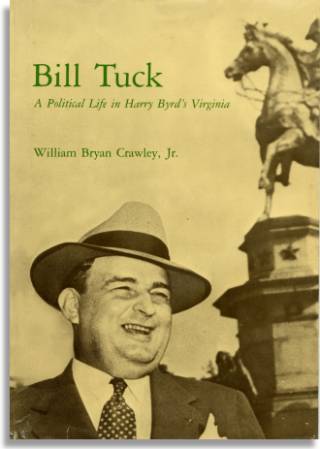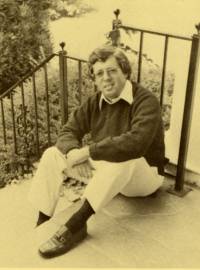
University of Virginia Press (1978). Index. 281pp. 6.125 x 9.25 inches. Hardcover. ISBN 0-8139-0766-7.
The only appropriate description for former Virginia governor Bill Tuck is sui generis — one of a kind. Although he was in many ways the archetypical organization politican, William Munford Tuck was also an unusually colorful figure in the powerful Virginia Democratic machine of Harry Flood Byrd. A country boy and not ashamed of it, he possessed an extravagantly outgoing, fun-loving personality. His conduct often shocked the genteel class of Virginia but fascinated the general populace.
William Bryan Crawley, Jr., describes and analyzes the political career of Bill Tuck and his relation with the Byrd organization. The introductory chapter provides useful insights into the growth and operation of the Byrd machine and discusses the peculiarly Virginian character of the organization. The next two chapters trace Tuck's early career, showing how he moved up the Byrd political ladder. Crawley shows that the reserved Byrd continued to view Tuck skeptically and that it was only with difficulty that Tuck secured Byrd's support for governor in 1945.
Most of the volume deals with Tuck's governorship of Virginia. Crawley discussed Tuck's controversial use of a militia draft to force settlement of a threatened strike by unionized power company employees. He shows how this led to significant antiunion labor laws, particularly in right-to-work law. He chronicles the governor's break with President Truman over the issue of civil rights. He points out how Virginia's “Anti-Truman Bill” that was originally designed to keep Truman's name off the ballot in Virginia in 1948 emphasized the alienation of the Byrd organization from the national Democratic party. Other significant events analyzed include revision of the tax structure, attempts at administrative reform, and the movement to abolish the poll tax.
The last three chapters are devoted to Tuck's postgubernatorial life, both while out of public office and as a U. S. congressman. The author's extensive research among public documents and personal papers is supplemented by numerous interviews with former governor Tuck.

William Bryan Crawley, Jr., is a native of Chatham, Virginia. He received his B. A. degree, magna cum laude, from Hampden-Sydney College where he was elected to Phi Beta Kappa. He received both his M. A. and Ph. D. degrees in history from the University of Virginia, where he was a member of the Raven Society and Omicron Delta Kappa. Since 1970 he has taught at Mary Washington college in Fredericksburg, Virginia, and is currently [1978] Associate Professor of History and Chairman of the Department of History. His primary fields of specialization are twentieth-century America and the history of the South.
This website is sponsored by Mitchells Publications, Chatham, Virginia.
Copyright © 2002–2008 Patricia B. Mitchell.